Emerging Contaminants Vol. 1: Occurrence and Impact » książka
topmenu
Emerging Contaminants Vol. 1: Occurrence and Impact
ISBN-13: 9783030690816 / Angielski / Miękka / 2022
Emerging Contaminants Vol. 1: Occurrence and Impact
ISBN-13: 9783030690816 / Angielski / Miękka / 2022
cena 523,30
(netto: 498,38 VAT: 5%)
Najniższa cena z 30 dni: 501,19
(netto: 498,38 VAT: 5%)
Najniższa cena z 30 dni: 501,19
Termin realizacji zamówienia:
ok. 22 dni roboczych.
ok. 22 dni roboczych.
Darmowa dostawa!
Emerging contaminants are chemical and biological agents for which there is growing concern about their potential health and environmental effects. The threat lies in the fact that the sources, fate and toxicology of most of these compounds have not yet been studied. Emerging contaminants, therefore, include a large number of both recently discovered and well-known compounds such as rare earth elements, viruses, bacteria, nanomaterials, microplastics, pharmaceuticals, endocrine disruptors, hormones, personal care products, cosmetics, pesticides, surfactants and industrial chemicals. Emerging contaminants have been found in many daily products, and some of them accumulate in the food chain. Correlations have been observed between aquatic pollution by emerging contaminants and discharges from wastewater treatment plants. Most actual remediation methods are not effective at removing emerging contaminants. This first volume presents comprehensive knowledge on emerging contaminants with a focus on analysis, toxicity, antibiotic resistance and human health.











